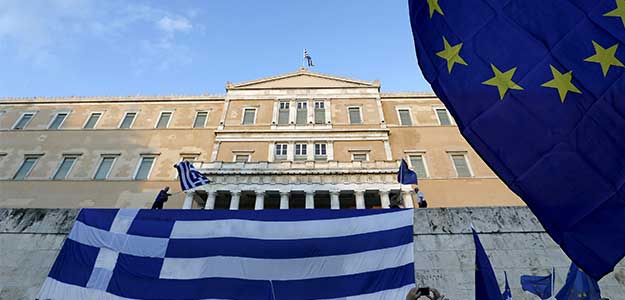
Eurozone nations will hold an emergency summit on Tuesday to discuss
the Greek referendum "No" result after the German and French leaders
called for a meeting, EU president Donald Tusk said.
The special meeting comes as Brussels reels with the implications of what the head of the Eurogroup of finance ministers from the 19-country block, Jeroen Dijsselbloem, called a "very regrettable" decision.
"I have called a EuroSummit Tuesday evening at 18h (1600 GMT) to discuss situation after referendum in Greece," Tusk said on Twitter on Sunday after Greek voters said a resounding "No" to creditor demands for further austerity in return for bailout funds.
It will come just 15 days after another eurozone summit called by Tusk failed to seal a deal between Greece and its EU-IMF creditors.
The Eurogroup will also hold a meeting on Tuesday before the summit to "discuss the state of play", Dijsselbloem said, while deputy finance ministers from the eurozone will meet on Monday.
"I take note of the outcome of the Greek referendum. This result is very regrettable for the future of Greece," Dijssebloem, the hardline Dutch finance minister, said in a statement.
"For recovery of the Greek economy, difficult measures and reforms are inevitable. We will now wait for the initiatives of the Greek authorities."
The Eurogroup on June 27 rejected Greece's appeal for an extension to its 240-billion-euro international bailout after Tsipras called the referendum, leaving Athens unable to pay a huge International Monetary Fund bill.
The European Commission, the powerful executive arm of the 28-nation EU, meanwhile said it said it "takes note of and respects" the result of the bailout referendum.
Commission president Jean-Claude Juncker will hold a teleconference on Monday morning with European Central Bank chief Mario Draghi, Tusk and Dijsselbloem, it said in a statement.
Juncker will also be "consulting tonight and tomorrow with the democratically elected leaders of the other 18 eurozone members as well as with the heads of the EU institutions," it added.
Juncker was a key broker during months of talks between Greece and its EU-IMF creditors, but hit out at Greek Prime Minister Alexis Tsipras after they broke down and said he felt "betrayed."
The special meeting comes as Brussels reels with the implications of what the head of the Eurogroup of finance ministers from the 19-country block, Jeroen Dijsselbloem, called a "very regrettable" decision.
"I have called a EuroSummit Tuesday evening at 18h (1600 GMT) to discuss situation after referendum in Greece," Tusk said on Twitter on Sunday after Greek voters said a resounding "No" to creditor demands for further austerity in return for bailout funds.
It will come just 15 days after another eurozone summit called by Tusk failed to seal a deal between Greece and its EU-IMF creditors.
The Eurogroup will also hold a meeting on Tuesday before the summit to "discuss the state of play", Dijsselbloem said, while deputy finance ministers from the eurozone will meet on Monday.
"I take note of the outcome of the Greek referendum. This result is very regrettable for the future of Greece," Dijssebloem, the hardline Dutch finance minister, said in a statement.
"For recovery of the Greek economy, difficult measures and reforms are inevitable. We will now wait for the initiatives of the Greek authorities."
The Eurogroup on June 27 rejected Greece's appeal for an extension to its 240-billion-euro international bailout after Tsipras called the referendum, leaving Athens unable to pay a huge International Monetary Fund bill.
The European Commission, the powerful executive arm of the 28-nation EU, meanwhile said it said it "takes note of and respects" the result of the bailout referendum.
Commission president Jean-Claude Juncker will hold a teleconference on Monday morning with European Central Bank chief Mario Draghi, Tusk and Dijsselbloem, it said in a statement.
Juncker will also be "consulting tonight and tomorrow with the democratically elected leaders of the other 18 eurozone members as well as with the heads of the EU institutions," it added.
Juncker was a key broker during months of talks between Greece and its EU-IMF creditors, but hit out at Greek Prime Minister Alexis Tsipras after they broke down and said he felt "betrayed."

No comments:
Post a Comment